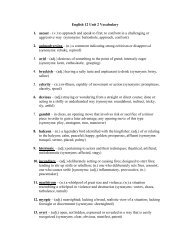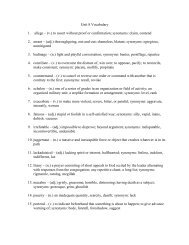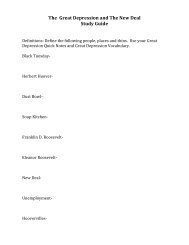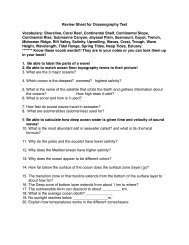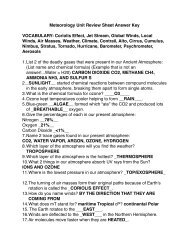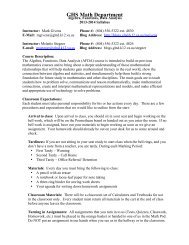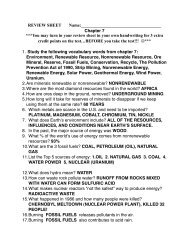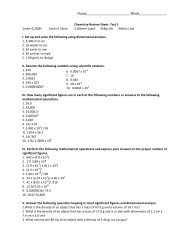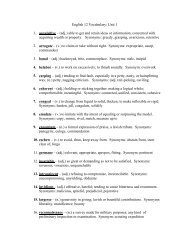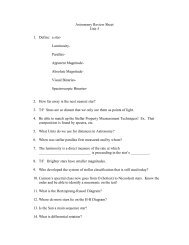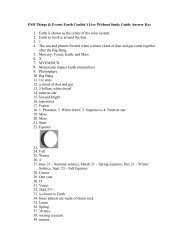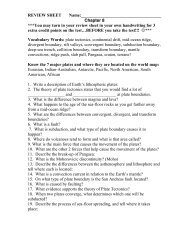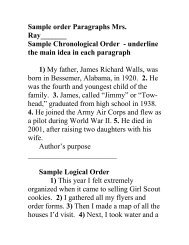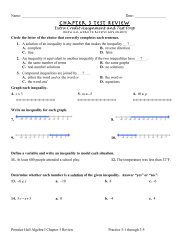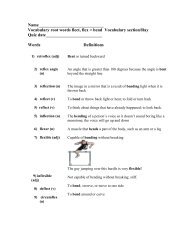Civics and Economics Review - Documents, Principles, Citizenship
Civics and Economics Review - Documents, Principles, Citizenship
Civics and Economics Review - Documents, Principles, Citizenship
Create successful ePaper yourself
Turn your PDF publications into a flip-book with our unique Google optimized e-Paper software.
<strong>Civics</strong> <strong>and</strong> <strong>Economics</strong> - Economic Terms <strong>and</strong> Characteristics<br />
7<br />
Economic Terms (CE.11a)<br />
People make choices about how to use limited resources, determine<br />
the ownership of resources, <strong>and</strong> structure markets for the<br />
distribution of goods <strong>and</strong> services.<br />
How do people deal with scarcity, resources, choice, opportunity<br />
cost, price, incentives, supply <strong>and</strong> dem<strong>and</strong>, production, <strong>and</strong><br />
consumption?<br />
Scarcity - the inability to satisfy all wants at the same time. All<br />
resources <strong>and</strong> goods are limited. This requires that choices be made.<br />
Resources - factors of production that are used in the production of<br />
goods <strong>and</strong> services. Types of resources are natural, human, capital,<br />
<strong>and</strong> entrepreneurship.<br />
Choice - selecting an item or action from a set of possible alternatives.<br />
Individuals must choose/make decisions about desired goods <strong>and</strong><br />
services because these goods <strong>and</strong> services are limited.<br />
Opportunity cost - what is given up when choice is made - highest<br />
valued alternative forgone. Individuals must consider value of what is<br />
given up when making a choice.<br />
Price - amount of money exchanged for a good or service. Interaction<br />
of supply <strong>and</strong> dem<strong>and</strong> determines price. Price determines who acquires<br />
goods <strong>and</strong> services.<br />
Incentives - things that incite or motivate. Incentives are used to<br />
change economic behavior.<br />
Supply <strong>and</strong> dem<strong>and</strong> is interaction<br />
of supply <strong>and</strong> dem<strong>and</strong> determines<br />
price. Dem<strong>and</strong> is amount of a good<br />
or service that consumers are<br />
willing <strong>and</strong> able to buy at a certain<br />
price. Supply is amount of a good<br />
or service that producers are willing<br />
<strong>and</strong> able to sell at a certain price.<br />
Production is the combining of<br />
human, natural, capital, <strong>and</strong> entrepreneurship resources to make goods<br />
or provide services. Resources<br />
available <strong>and</strong> consumer preferences determine what is produced.<br />
Consumption is using goods <strong>and</strong> services. Consumer preferences <strong>and</strong><br />
price determine what is purchased <strong>and</strong> consumed.<br />
Characteristics of major economic systems (CE.11b)<br />
Every country must develop an economic system to determine how to<br />
use its limited resources. The key factor in determining the type of<br />
economy is the extent of government involvement.<br />
Three Basic Questions of <strong>Economics</strong><br />
Each type of economy answer the three basic questions differently:<br />
1. What will be produced?<br />
2. Who will produce it?<br />
3. For whom will it be produced?<br />
No country relies exclusively on markets to deal with the economic<br />
problem of scarcity<br />
Basic Characteristics of Economic Systems<br />
Traditional Economy:<br />
Economic decisions are based on custom <strong>and</strong> historical precedent<br />
People often perform the same type of work as their parents <strong>and</strong><br />
gr<strong>and</strong>parents, regardless of ability or potential<br />
Free Market:<br />
Private ownership of property/resources<br />
Profit motive<br />
Competition<br />
Consumer sovereignty<br />
Individual choice<br />
Minimal government involvement in the economy<br />
Comm<strong>and</strong> Economy:<br />
Central ownership (usually by the government) of property/<br />
resources<br />
Centrally-planned economy<br />
Lack of consumer choice<br />
Mixed Economy:<br />
Individuals <strong>and</strong> businesses as owners <strong>and</strong> decision makers for<br />
private sector<br />
Government as owner <strong>and</strong> decision maker for the public sector<br />
Government role is greater than in free market economy, less than<br />
comm<strong>and</strong><br />
Most economies today (including the United States) are mixed<br />
economies.<br />
Characteristics of the United States economy (CE.11c)<br />
The United States economy is primarily a free market economy, but<br />
because there is some government involvement it is characterized as a<br />
mixed economy.<br />
Government intervenes in a market economy when<br />
the perceived benefits of a government policy outweigh<br />
the anticipated costs.<br />
Markets - are allowed to operate without undue interference from<br />
the government. Prices are determined by supply <strong>and</strong> dem<strong>and</strong> as<br />
individual buyers <strong>and</strong> sellers interact in the marketplace.<br />
Private property - Individuals <strong>and</strong> businesses have right to own<br />
personal property as well as means of production without undue<br />
interference from government.<br />
Profit - consists of earnings after all expenses have been paid.<br />
Competition - Rivalry between producers/sellers of a good or<br />
Service results in better quality goods <strong>and</strong> services at a lower price.<br />
Consumer sovereignty - Consumers determine through purchases,<br />
what goods <strong>and</strong> services will be produced.<br />
Basic types of business ownership (CE.12a)<br />
There are three basic ways that businesses organize to earn<br />
profit.<br />
Proprietorship - one owner who takes all the risks <strong>and</strong><br />
all the profits.<br />
Partnership - two or more owners who share risks <strong>and</strong><br />
profits.<br />
Corporation - business organization authorized by law<br />
to act as a legal person regardless of number of owners.<br />
Owners share the profits. Owner liability is limited to<br />
investment.<br />
Entrepreneur - person who takes risks to<br />
produce goods <strong>and</strong> services in search of profit.<br />
Entrepreneurs may establish a business according to any<br />
of the three types of organizational structures.<br />
Entrepreneurs play an important role in all three types of business<br />
organizations.<br />
Virginia St<strong>and</strong>ards of Learning (2008), Rebecca Mills, Supervisor of Social Studies, Spotsylvania County Schools



